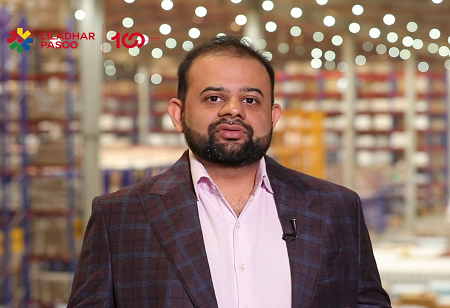 Magazine
Magazine

India’s warehousing market is expected to reach INR 2,872.10 bn by 2027, expanding at a CAGR of ~15.64% during 2022-2027. With the boom in e-commerce, last-mile deliveries, just-in-time deliveries, and omnichannel operations, the warehousing sector is witnessing exponential growth. Government initiatives and policies such as single window clearances, NLP, and foreign investments have contributed to the positive growth of the Indian warehousing sector. The Make in India initiative by the government has boosted the manufacturing sector.
The increase in domestic manufacturing activities subsequently fuelled the demand for warehousing facilities in the country. Over the years, warehousing as a sector has become more organized. The widespread adoption of tech has further led to a boom with businesses relying on AI, IoT, ML, robotics, and automation to streamline storage and distribution operations.
Technology has contributed to a more consistent, efficient, and accurate warehouse operation. With the growth of 3PL providers and the expansion of warehousing facilities in India, shared or multi-client warehousing has emerged as a practical solution for growing businesses. Sharing the costs of space, labor, and technology ensures flexibility for businesses. This article will elaborate on the benefits of adopting a multi-client warehousing solution by outsourcing to a 3PL provider.
No investment in CAPEX Businesses running a dedicated warehouse is fully responsible for the fixed costs incurred for space, personnel, and technology, including investments towards recruiting, and training warehouse staff, and maintenance of warehouse equipment. These are to be borne by the business irrespective of fluctuations in demand and production. However, with multi-client warehousing solutions, costs are variable by the number of products stored and shipped out, eliminating the need for CAPEX investment. The cost of personnel, technology, and equipment are built into the pricing package for using the space. This results in lesser costs and enables businesses to plan more efficiently as the costs are now more predictable.
Flexible and agile business operations
Businesses enjoy greater flexibility with multi-client warehousing solutions, including flexibility of long-term or short-term contract commitments. Managing a dedicated warehouse usually requires multi-year contracts. In addition to contracts, businesses can also enjoy the flexibility to opt-in and opt out of certain services, depending on market demand, trends, and customer feedback.
Valleys and peaks in sales can be easily accommodated with shared warehousing solutions as there is greater control and flexibility over warehouse space utilization when there are multiple clients sharing the same warehouse. Businesses can also test new markets with smaller shared warehouse spaces spread throughout the country instead of one centrally located dedicated warehouse.
Access to industry best practices and trained staff
Warehouses have now evolved to include value-added services such as packing, kitting, bundling, labeling, and more. When using a multi-client warehousing solution, businesses can easily gain access to value-added services, industry best practices, and trained personnel without spending exorbitant amounts of money. This is especially significant for smaller businesses that cannot waste their resources on developing in-house expertise. 3PLs dealing in multi-client warehousing have strategic partnerships with carriers that enable them to negotiate better shipping charges and extend shipping cut-off time. These benefits are passed on to the clients, helping businesses avail services at reasonable prices.
Leverage cutting-edge technology
3PL providers employ cutting-edge technology to conduct warehousing operations. They own state-of-the-art facilities to stay competitive and compliant with regulations. Availing of a multi-client warehousing solution enables businesses to leverage new tools and tech innovations at a fraction of the cost.Implementing the latest technology demands significant upfront investment. Warehouses by 3PL providers come equipped with sophisticated technology as they have a huge client base with complex supply chains. Hence, smaller businesses to get the benefits of progressive technology at lesser costs when opting for a multi-client warehousing solution.
Access to best-in-class services
Managing a warehouse encompasses several activities such as regular maintenance of the warehousing equipment, implementation of advanced security measures, and personnel training among others. Opting for shared warehousing solutions enables access to best-in-class services. As professional 3PL firms have deep experience in catering to diverse industries with the latest tech and tools, businesses can enjoy multiple benefits in the form of real-time inventory management, order visibility, enhanced security, optimized storage, picking, and packing, and reduced cost and errors. Also, the cargo risk and liability are transferred to the service provider who can offer better know-how of safety and security systems since the onus of cargo safety is with the service provider.
Outsourcing warehousing operations to 3PL providers is advantageous for businesses in many ways. It is a cost-effective and flexible solution as businesses pay only for the space they use and can also adjust their agreement with the warehouser if they want to scale up or down. 3PL providers offer specialized solutions for handling oversized or fragile cargo and ensure add-on services, increased security, and quicker delivery. Hiring a 3PL warehousing company will save you time, money, and hassle, and help channel your valuable resources to improving your core competencies.
We use cookies to ensure you get the best experience on our website. Read more...